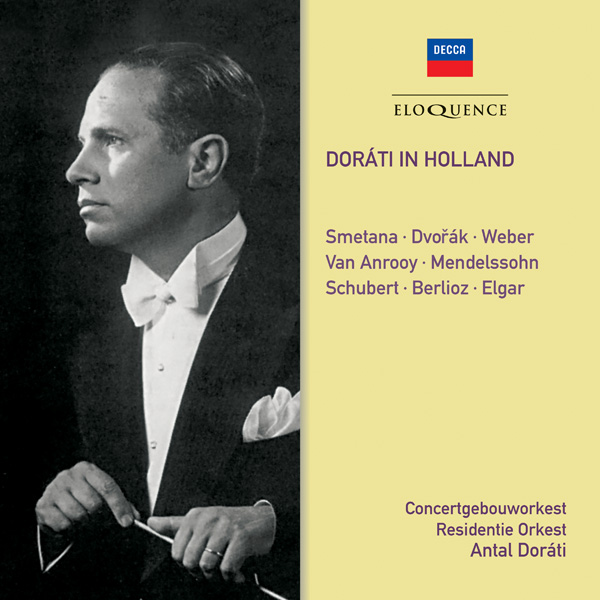‘I think that every art is an art of authority but between “authoritarian” and “dictatorial” there is a vast difference.’ So remarked the Hungarian conductor, Antal Doráti, towards the end of a long career which included, near its beginning, almost a decade spent working closely with orchestras in The Hague and Amsterdam. That work, very little known now, is revived on the present 2CD set which includes many recordings new to CD or in their first international release.
Dorati’s sentiment does not entirely square with the firebrand who terrorised his orchestras as well as electrifying his audiences during the 1950s when these recordings were made. The director of the Hague Philharmonic was once confronted by Doráti in a rage and a heavy glass ashtray flying towards his head (he ducked). Though the Residentie orchestra was regarded, then as now, in terms inferior to the Concertgebouw, they still attracted musicians of the calibre of Doráti and Ginette Neveu.
The conductor was already renowned in both Europe and the US for his idiomatic flair in the music of Dvořák and the young Philips label was keen to expand its catalogue with orchestral showpieces such as the less-familiar Slavonic Rhapsodies which were split between the two Dutch orchestras. The conductor also took on a local composer, Peter van Anrooy and his vividly orchestrated rhapsody, based on the life of an 18th-century Dutch naval hero, Piet Hein.
Most of the recordings here – overtures by Mendelssohn, Weber and Schubert – arose from the sudden death of the Concertgebouw’s principal conductor, Eduard van Beinum in April 1959. Three days of sessions in the studio had already been booked for September of the same year and Doráti filled most of them in his efficient way: ‘I always enjoyed making recordings,’ he said. ‘There is never a danger that anything is too perfect. The danger is always that it is too imperfect.’ The opening item, Smetana’s ‘Vltava’, had been recorded in February 1952 and issued as the filler to the Fourth Symphony of Tchaikovsky which has been released separately on Eloquence (482 5553); it was incorporated by Philips into a ‘Má Vlast’ which Doráti and the Concertgebouw completed in September 1956.
CD 1
BEDŘICH SMETANA
Vltava (Má Vlast)
ANTONÍN DVOŘÁK
Slavonic Rhapsody in D major, Op. 45 No. 1
Slavonic Rhapsody in G minor, Op. 45 No. 2
Slavonic Rhapsody in A flat major, Op. 45 No. 3
PETER VAN ANROOY
Piet Hein Rapsodie
FELIX MENDELSSOHN
Ouvertüre Meeresstille und glückliche Fahrt, Op. 27*
CD 2
FRANZ SCHUBERT
Ouvertüre im italienischen Still in C major, D.591*
CARL MARIA VON WEBER
Der Freischütz: Overture, Op. 77
Euryanthe: Overture, Op. 81
Oberon: Overture, Op. 67
Preciosa: Overture, Op. 78*
HECTOR BERLIOZ
Scène d’amour (Roméo et Juliette, Op. 17)
La Damnation de Faust, Op. 24: orchestral excerpts
EDWARD ELGAR
Pomp and Circumstance March in D major, Op. 39 No. 1
Concertgebouworkest (CD1: 1–3, 6; CD2)
Residentie Orkest (CD1: 4, 5)
Antal Doráti
FIRST INTERNATIONAL RELEASE ON DECCA CD (*FIRST RELEASE IN STEREO)
Recording Producer: Jaap van Ginneken
Recording Engineers: unknown (Smetana, Van Anrooy); Henk Jansen, Cees Hunziga (Dvořák: Slavonic Rhapsody No. 1); Henk Jansen, Willem van Leeuwen, Tony Buczynski (Weber, Mendelssohn, Schubert, Berlioz); Henk Jansen, Cees Huinziga, Willem van Leeuwen (Elgar)
Recording Locations: Concertgebouw, Amsterdam, The Netherlands, 21 February 1952 (Smetana), 15 September 1956 (Dvořák: Slavonic Rhapsody No.1), 22 October 1957 (Dvořák: Slavonic Rhapsody No. 2), 23–25 September 1959 (Mendelssohn, Schubert, Weber, Berlioz), 25 September 1959 (Elgar); The Hague, Netherlands, 6–8 October 1952 (Dvořák: Slavonic Rhapsody No. 3, Van Anrooy)
Remastering Engineers: Chris Bernauer, Craig Thompson
‘Berlioz’s ‘Rakoczy’ March and Elgar’s ‘Pomp and Circumstance’ March No.1 are brilliantly played by the Concertgebouw Orchestra under Doráti.’ Gramophone, October 1954

